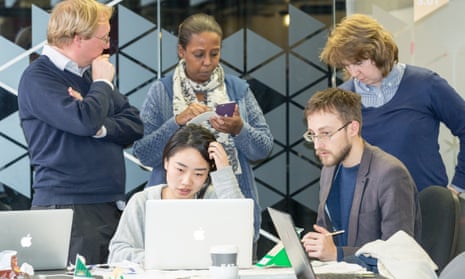Last month digital technology consultant Zainab Ibrahim was one of 100-plus developers, designers and NHS staff who took part in a two-day hackathon – where coders collaborate to create new software over a short time period – to design tools to help migrants navigate the health service in the UK. Originally from Iraq, Ibrahim knows only too well how confusing the NHS can be when you are new to the country.
One particular memory sticks out; 10 years ago when she first arrived as a student, she felt ill so went to her nearest doctor’s surgery but there weren’t any appointments free until the following week. Confused, she explained to the receptionist that she felt ill right now, not next week. Back home, seeing your doctor was a far simpler process. The time-poor receptionist barked that she should go to the nearest “walk-in”, but to Ibrahim, who wasn’t fluent in English at the time, the phrase meant nothing. Looking around, she asked where she should walk in to and was met with a rude rebuff.
“The NHS is so complicated for people who are from different cultures and mindsets and speak different languages,” says Ibrahim, who received threats from al-Qaida before leaving her home country. “It was hard when I first arrived. GPs, for example, are already loaded with so much work, they don’t have time to explain things properly. And many people who come here are traumatised like I was and when you’re ill, you feel worse.”
It’s situations like Ibrahim’s that organiser Raj Adgopul hopes to address. A specialist community public health nurse based in Dorset, Adgopul recently won the Mary Seacole award to design an app to help migrants understand how the UK healthcare system works. Organising the hack weekend was his way of building the groundwork for the app, as well as acting as a consultation process.
“This approach hasn’t been done before. It’s usually just tech people who do hackathons,” Adgopul says. “What I’ve done is bring health professionals and business analysts to join them. I just thought it would be a great idea to help me design the app. I had the option of going to a technology company, which would have cost thousands of pounds, or doing this. I have only spent £12 on the website domain name, everything else – from the use of the venue to the food we put on – was donated.”
With 35 different nationalities represented, many of those taking part had first-hand experience of navigating the NHS as a newcomer to this country, while others were simply passionate about making the health service better. One of the participants, Badria Jibril, a child psychiatrist with the west London mental health trust, believes the hackathon concept should be tried out for other problems in the NHS.
“I decided to come because I had a lot of frustration about how things are going in the health service and I wanted to think about ways to improve things,” she says. “I am not a tech person, but I am interested to see how technology can improve the service for everyone, not just migrants, as I think all people would benefit from the ideas we’ve had. I have so much hope about what can be achieved now.”
On the first day participants were split into groups – with healthcare professionals spread out equally – to tackle different areas of the system including pharmacies, hospital visits and stays, and midwifery. By the end of the weekend all teams had built prototype apps or websites and got up on stage to present their ideas to the judges, as is typical at hackathons. Adgopul intends to take all of the ideas forward, not just the winning team’s.
The ideas were varied and innovative. One of the apps, Healthpass, was designed to improve patient safety in A&E and featured an easy-to-navigate Tinder-style patient history questionnaire with text that could be translated into numerous languages. The results would be downloaded by the nurse or doctor treating the patient, ensuring that any allergies or medical conditions such as diabetes were highlighted.
Another app for new mothers featured an interactive timeline of all the dates for health visits, vaccinations and check-ups for their baby. A key feature for migrants who are not used to health visits – and may be suspicious or defensive of the intrusion – was the use of simple video explainers showing what to expect from each health visit or appointment.
In the end, an app for GP visits, which included a downloadable letter stating a person’s rights to healthcare in this country, won over the judges. Individual prizes were also given and a tearful Ibrahim won the outstanding contribution award.
“It’s so overwhelming to see what can be done in a short space of time, it was amazing,” she concludes. “I really wanted to do something to help others in a similar position to the one I was in and even though it’s only the first stage, I’m really excited. It means so much to someone like me who has been through this.”
Join the Healthcare Professionals Network to read more pieces like this. And follow us on Twitter (@GdnHealthcare) to keep up with the latest healthcare news and views.
